Month: August 2022
‘Planta Sapiens’ by Paco Calvo
Rohan Silva at The Guardian:
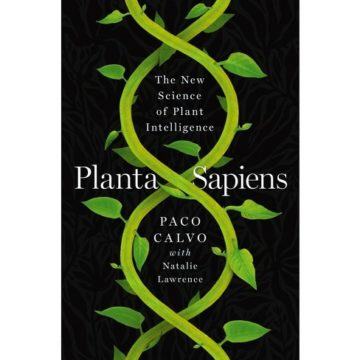 Plant blindness. That’s what scientists call the way we humans often fail to notice the staggering diversity and complexity of plant life around us. The philosopher Paco Calvo seems to be mercifully free from this affliction – he runs a laboratory in Spain studying plant behaviour, trying to figure out if that half-dead fern that you forgot to water on the windowsill ought to be classified as “intelligent”.
Plant blindness. That’s what scientists call the way we humans often fail to notice the staggering diversity and complexity of plant life around us. The philosopher Paco Calvo seems to be mercifully free from this affliction – he runs a laboratory in Spain studying plant behaviour, trying to figure out if that half-dead fern that you forgot to water on the windowsill ought to be classified as “intelligent”.
Some flowers turn towards the sun as it tracks across the sky, and some plants close their leaves when touched, but traits like these are generally assumed to be automatic reflexes, no different to the way your leg jerks out when you get tapped on the knee.
In Planta Sapiens, Calvo tries to show us that our green friends do far more than just blindly react.
more here.
Edie Sedgwick, As Seen By Her Sister
Hillary Kelly at The New Yorker:
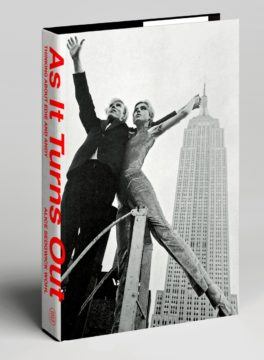 Naturalness is the muse’s great gift. Like Helga Testorf, who merely had to stand still for Andrew Wyeth to want to transpose her spirit, Sedgwick had only to walk and talk for Warhol to track her every move on film. “Andy always picks people because they have an amazing sort of essential flame, and he brings it out for the purposes of his films,” the curator Henry Geldzahler once said. “He never takes anybody who has nothing and makes them into something. What he did was recognize that Edie was this amazing creature, and he was able to make her more Edie so that when he got it on camera it would be made available to everybody.” Warhol’s movies captured Sedgwick just being herself: putting on makeup, lying in bed, perching on a couch arm while looking about the room. She appeared in more than a dozen films, such as “Face,” a seventy-minute-long closeup, and “Afternoon,” a scripted “chamber opera” in which Sedgwick and friends gas around in her apartment, high on amphetamines. Sedgwick Wohl, who has spent decades watching her sister on film, observes her as if looking through a high-powered telescope. “What they saw in her was not talent but simply the way she was, transcribed onto the screen,” Sedgwick Wohl writes.
Naturalness is the muse’s great gift. Like Helga Testorf, who merely had to stand still for Andrew Wyeth to want to transpose her spirit, Sedgwick had only to walk and talk for Warhol to track her every move on film. “Andy always picks people because they have an amazing sort of essential flame, and he brings it out for the purposes of his films,” the curator Henry Geldzahler once said. “He never takes anybody who has nothing and makes them into something. What he did was recognize that Edie was this amazing creature, and he was able to make her more Edie so that when he got it on camera it would be made available to everybody.” Warhol’s movies captured Sedgwick just being herself: putting on makeup, lying in bed, perching on a couch arm while looking about the room. She appeared in more than a dozen films, such as “Face,” a seventy-minute-long closeup, and “Afternoon,” a scripted “chamber opera” in which Sedgwick and friends gas around in her apartment, high on amphetamines. Sedgwick Wohl, who has spent decades watching her sister on film, observes her as if looking through a high-powered telescope. “What they saw in her was not talent but simply the way she was, transcribed onto the screen,” Sedgwick Wohl writes.
more here.
In Julian Barnes’s New Novel, a Teacher’s Pet Becomes Obsessed
Molly Young in The New York Times:
 Are you prepared for a vision of sizzling sexuality? Picture this. A woman dressed in brown suede brogues and a below-the-knee skirt, her legs obscured by stockings. Sandy-gray hair. A discreet brooch pinned to her blouse, a formal manner of speaking, a keen interest in antiquity and a tendency to suffer from migraines. These qualities may not scream “racy” or “seductive” or “exotic” to you, but you are not the narrator of Julian Barnes’s 25th book.
Are you prepared for a vision of sizzling sexuality? Picture this. A woman dressed in brown suede brogues and a below-the-knee skirt, her legs obscured by stockings. Sandy-gray hair. A discreet brooch pinned to her blouse, a formal manner of speaking, a keen interest in antiquity and a tendency to suffer from migraines. These qualities may not scream “racy” or “seductive” or “exotic” to you, but you are not the narrator of Julian Barnes’s 25th book.
The siren is Elizabeth Finch, a teacher of adult education courses in London two decades ago. The narrator is her student, the somewhat dimwitted but diligent Neil. On the first day of class, Elizabeth outlines her pedagogical method: “I shall not attempt to stuff you with facts as a goose is stuffed with corn; this would only lead to an engorged liver, which would be unhealthy.” Neil is besotted. Intrigued by Finch’s poise, dazzled by her confidence, he concocts wild fantasies about her extracurricular life: silk pajamas, Italian lakes, French vineyards, mysterious lovers.
When the course ends, Neil bravely invites his crush to lunch, and for 20 years they dine twice or thrice annually. It’s unclear what Elizabeth gets out of the meetings. What Neil gets is the opportunity to be outwitted by a woman of formidable reticence and intellect. He is, if not quite a glutton for punishment, then at least someone with a hearty appetite for it.
More here.
What is left of Princess Diana?
Tanya Gold in New Statesman:
 At Althorp, the Northamptonshire estate where she lived as a young woman, there is a drawing of Diana Spencer, round-faced and smiling. It was made when she was a child, and unhappy: her mother, Frances, had left the family. It is a private family artefact, and something else too: an early study in iconography, in making Diana something she was not. Her marriage to Prince Charles made Diana a paradigm. A queen exists to be a paradigm – that is her job – but an unhappy, divorced almost-queen, who died while being chased by the mass media that both deified and abused her, is another category of paradigm entirely. The drawing reminds me that she was once a private individual, but she became something else.
At Althorp, the Northamptonshire estate where she lived as a young woman, there is a drawing of Diana Spencer, round-faced and smiling. It was made when she was a child, and unhappy: her mother, Frances, had left the family. It is a private family artefact, and something else too: an early study in iconography, in making Diana something she was not. Her marriage to Prince Charles made Diana a paradigm. A queen exists to be a paradigm – that is her job – but an unhappy, divorced almost-queen, who died while being chased by the mass media that both deified and abused her, is another category of paradigm entirely. The drawing reminds me that she was once a private individual, but she became something else.
In the 25 years since her death, and the insatiable public mourning that followed, and the royal family’s dash to London to preserve their power, Diana the woman has been obscured by interpretations of Diana “the People’s Princess”. There are films, television shows, memoirs, awards, documentaries, conspiracy theories. There are commemorative plates, coins, dolls, tubs of margarine. There are physical memorials – monuments, statues, and a fountain – where the besotted still pay their respects. Even so, the Diana trail has become strewn with tumbleweed. She is now a collection of emotions and memories and scattered artefacts: a myth. What, if anything, is left of her?
More here.
Saturday Poem
La Guerre (I)
Humanity i love you
because you would rather black the boots of
success than enquire whose soul dangles from his
watch-chain which would be embarrassing for both
parties and because you
unflinchingly applaud all
songs containing the words country home and
mother when sung at the old howard
Humanity i love you because
when you’re hard up you pawn your
intelligence to buy a drink and when
you’re flush pride keeps
you from the pawn shop and
because you are continually committing
nuisances but more
especially in your own house
Humanity i love you because you
are perpetually putting the secret of
life in your pants and forgetting
it’s there and sitting down
on it
and because you are
forever making poems in the lap
of death Humanity
i hate you
E.E. Cummings
from E.E. Cummings Complete Poems
Liverwright Publishing, New York – London
Friday Poem
Traveler, There is no Road
Traveler, your footprints
are the only road, nothing else.
Traveler, there is no road;<
you make your own path as you walk.
As you walk, you make your own road,
and when you look back
you see the path
you will never travel again.
Traveler, there is no road;
only a ship’s wake on the sea.
by Antonio Machado
Caminante, No Hay Camino
Caminante, son tus huellas
el camino y nada más;
Caminante, no hay camino,
se hace camino al andar.
Al andar se hace el camino,
y al volver la vista atrás
se ve la senda que nunca
se ha de volver a pisar.
Caminante, no hay camino
sino estelas en la mar.
by Antonio Machado (Thank you, Abbas— excellent find)
How Arab Filmmakers Investigate the Desert
Róisín Tapponi at Frieze:
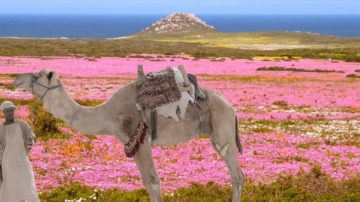 In the gulf, thirst is a paradigm: it is impossible to think about the desert without thinking about water. The Arabian Desert is also a peninsula, with countries formed from both deserts and ports. I propose thirst trap theory – derived from the slang for a selfie used to elicit an exchange between sexual bodies – as a way of reading this relation between desert and surrounding water, between drought and abundance, in cinema from the Gulf. Ranging from narrative cinema to experimental video, these films are as diverse – and extreme – as the landscape that inspired them.
In the gulf, thirst is a paradigm: it is impossible to think about the desert without thinking about water. The Arabian Desert is also a peninsula, with countries formed from both deserts and ports. I propose thirst trap theory – derived from the slang for a selfie used to elicit an exchange between sexual bodies – as a way of reading this relation between desert and surrounding water, between drought and abundance, in cinema from the Gulf. Ranging from narrative cinema to experimental video, these films are as diverse – and extreme – as the landscape that inspired them.
Using deep time and sweltering geological dreamscapes, Sophia Al Maria’s experimental videos The Future Was Desert I and II (both 2016) explore the political relations between nation states through the imaging of natural resources. We see sublime shots of oil, water and fire exploding across regional landscapes, taken from various scientific, colonial and geographical archives.
more here.
The going gets turf: do lawns have a future in the age of drought?
Tom Banham in 1843 Magazine:
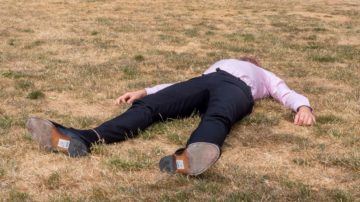 The lawns at Tusmore House, a neo-Palladian mansion 15 miles north of Oxford, are so perfectly flat and exactingly shorn that they induce a kind of vertigo. Unlike familiar grass, with its divots and erupting daisies, the grass here feels as though it might evaporate underfoot in a cloud of pixels. On a sticky afternoon last summer, David Hedges-Gower, a four-decade veteran of the turf industry and grass whisperer to the wealthy, inspected what looked to the layman like flawless green carpet and found it wanting.
The lawns at Tusmore House, a neo-Palladian mansion 15 miles north of Oxford, are so perfectly flat and exactingly shorn that they induce a kind of vertigo. Unlike familiar grass, with its divots and erupting daisies, the grass here feels as though it might evaporate underfoot in a cloud of pixels. On a sticky afternoon last summer, David Hedges-Gower, a four-decade veteran of the turf industry and grass whisperer to the wealthy, inspected what looked to the layman like flawless green carpet and found it wanting.
Paul Gough, Tusmore’s head gardener and the man responsible for the lawns’ day-to-day upkeep, agreed. Ordinarily, he’d mow the grass down to 12mm, just long enough to withstand seasonal variations in temperature and rainfall. But Tusmore’s owner, Wafic Saïd, a Syrian businessman and philanthropist who once helped arrange a $50bn-and-counting arms deal between Britain and Saudi Arabia, had been in residence, so they’d mown golf-green short. Weeks of scorching heat and relentless rain had bruised the turf. There were spots of fungus and clover, as well as encroaching annual meadow-grass, which is subtly different to the bentgrass and fescue that were sown here at great expense. (The difference is too subtle for herbicides – patches of meadow-grass have to be cut out with a pocket knife.)
More here.
A Philosophical Guide To Love And Rupture
Aaron Schuster at Cabinet Magazine:
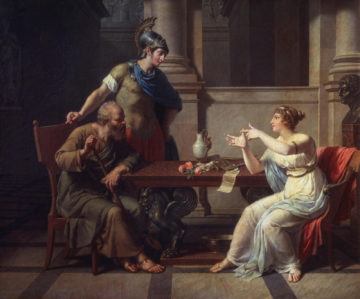 What if the secret of the Symposium was that it is not so much about love as breaking up? Just as we speak of Platonic love, so we should speak of the Platonic breakup, which is, of course, the ideal form of the breakup. Its formula, invented by Socrates, has two parts:
What if the secret of the Symposium was that it is not so much about love as breaking up? Just as we speak of Platonic love, so we should speak of the Platonic breakup, which is, of course, the ideal form of the breakup. Its formula, invented by Socrates, has two parts:
1) I am nothing.
2) You would be happier with someone else.
In what follows, I will sketch a brief history of this formula, culminating in the peculiar amorous adventure that is psychoanalysis. But first, what does Plato mean by it?
The formula concerns the end of the affair between Socrates and Alcibiades. The dazzlingly brilliant and bewildering philosopher and the dashing, larger-than-life general and politician were one of the great couples of the Golden Age of Athens.
more here.
Germany
Morgan Meis at Slant Books:
 My cat died in Germany once. In Cologne. I remember the city being very ugly and the famous cathedral being so black, completely covered in soot. I’m not against ugly cities and truth be told I rather enjoy them. Cities should be ugly. Of course, that’s an absurd thing to say. There’s nothing more lovely than a lovely city. I was reminded of this recently when I traveled from Berlin to Paris. Berlin is so ugly and Paris is so beautiful. Whatever doubts I might have had that Berlin is just really ugly, my father squashed them for me on a brief visit to the city while I was staying there. We were walking through the city, making our way from the Motel One he was staying at on Alexanderplatz to the little Airbnb where I was living in Prenzlauerberg with my old and assiduous friend Stevie and I was watching my father move ever so slowly through the not-so-interesting streets that connect the two neighborhoods and as we stopped at the second or third cafe for him to catch his breath and take a rest I realized that he is genuinely elderly now. It’s an indistinct threshold, being old. But he has become old. That is what happens, of course. There is no shame in it. Will Germany kill my father, just as it killed my cat, I wondered to myself. It was hot in Berlin that week. We should have taken the U-Bahn or even a cab. But I wanted to walk with my aging father through the streets of Berlin. I was feeling tenderly toward him, even though I, and simultaneously Berlin itself, were both trying to kill him.
My cat died in Germany once. In Cologne. I remember the city being very ugly and the famous cathedral being so black, completely covered in soot. I’m not against ugly cities and truth be told I rather enjoy them. Cities should be ugly. Of course, that’s an absurd thing to say. There’s nothing more lovely than a lovely city. I was reminded of this recently when I traveled from Berlin to Paris. Berlin is so ugly and Paris is so beautiful. Whatever doubts I might have had that Berlin is just really ugly, my father squashed them for me on a brief visit to the city while I was staying there. We were walking through the city, making our way from the Motel One he was staying at on Alexanderplatz to the little Airbnb where I was living in Prenzlauerberg with my old and assiduous friend Stevie and I was watching my father move ever so slowly through the not-so-interesting streets that connect the two neighborhoods and as we stopped at the second or third cafe for him to catch his breath and take a rest I realized that he is genuinely elderly now. It’s an indistinct threshold, being old. But he has become old. That is what happens, of course. There is no shame in it. Will Germany kill my father, just as it killed my cat, I wondered to myself. It was hot in Berlin that week. We should have taken the U-Bahn or even a cab. But I wanted to walk with my aging father through the streets of Berlin. I was feeling tenderly toward him, even though I, and simultaneously Berlin itself, were both trying to kill him.
More here.
Heatwave in China is the most severe ever recorded in the world
Michael Le Page in New Scientist:
 Low rainfall and record-breaking heat across much of China are having widespread impacts on people, industry and farming. River and reservoir levels have fallen, factories have shut because of electricity shortages and huge areas of crops have been damaged. The situation could have worldwide repercussions, causing further disruption to supply chains and exacerbating the global food crisis.
Low rainfall and record-breaking heat across much of China are having widespread impacts on people, industry and farming. River and reservoir levels have fallen, factories have shut because of electricity shortages and huge areas of crops have been damaged. The situation could have worldwide repercussions, causing further disruption to supply chains and exacerbating the global food crisis.
People in large parts of China have been experiencing two months of extreme heat. Hundreds of places have reported temperatures of more than 40°C (104°F), and many records have been broken. Subway stations have set up rest areas where people can recover from the heat.
On 18 August, the temperature in Chongqing in Sichuan province reached 45°C (113°F), the highest ever recorded in China outside the desert-dominated region of Xinjiang.
More here.
The Asset Economy Strikes Again
Martijn Konings in the Boston Review:
 Rumors of the death of neoliberalism are indeed greatly exaggerated. At a moment when economic authorities are calling for higher unemployment to combat supply-side inflation, it is essential to recall how U.S. political economy has been remade to serve the interests of asset owners at the expense of wage-earners. Only by reckoning with this asset economy head on can we envision a future that breaks free of it.
Rumors of the death of neoliberalism are indeed greatly exaggerated. At a moment when economic authorities are calling for higher unemployment to combat supply-side inflation, it is essential to recall how U.S. political economy has been remade to serve the interests of asset owners at the expense of wage-earners. Only by reckoning with this asset economy head on can we envision a future that breaks free of it.
More here.
Tribute to 80’s Entertainment: A bit of Friday nostalgia
Almost everything Tucker Carlson said about Anthony Fauci this week was misleading or false
Jon Cohen in Science:
 Tucker Carlson, a political commentator on Fox News, has long assailed Anthony Fauci for his role in the U.S. government’s response to the COVID-19 pandemic during both former President Donald Trump’s and President Joe Biden’s administrations. But on 22 August, when Fauci announced he would be retiring from his jobs as director of the U.S. National Institute of Allergy and Infectious Diseases (NIAID) and chief medical adviser to the president at the end of year, the Tucker Carlson Tonight host laid into him like never before. Carlson asserted Fauci had committed “very serious crimes” and said he “apparently engineered the single most devastating event in modern American history.” Carlson, infamous for assailing people’s looks, also called Fauci a “an even tinier version of the Dalai Lama” and a “Stalinist midget.”
Tucker Carlson, a political commentator on Fox News, has long assailed Anthony Fauci for his role in the U.S. government’s response to the COVID-19 pandemic during both former President Donald Trump’s and President Joe Biden’s administrations. But on 22 August, when Fauci announced he would be retiring from his jobs as director of the U.S. National Institute of Allergy and Infectious Diseases (NIAID) and chief medical adviser to the president at the end of year, the Tucker Carlson Tonight host laid into him like never before. Carlson asserted Fauci had committed “very serious crimes” and said he “apparently engineered the single most devastating event in modern American history.” Carlson, infamous for assailing people’s looks, also called Fauci a “an even tinier version of the Dalai Lama” and a “Stalinist midget.”
Carlson seems to relish criticisms of his comments, which inevitably draw more attention to him and his show. But at the risk of playing into his hand, Science fact-checked his criticisms of Fauci. The analysis shows Carlson took facts out of context and cited long-debunked studies or reports to attack Fauci. He also repeatedly blamed Fauci and other scientists for changing their minds based on new evidence—the bedrock of scientific progress. In Carlson’s calculus, such reversals equal lying.
Here are annotated fragments from a full transcript of the show posted on Fox News’s website. “Imagine the pandemonium at SoulCycle studios across the Northeast this morning when Tony Fauci announced his retirement. Ugly doesn’t begin to describe it. Picture the chaos, if you can, in the organic chaga aisle at Whole Foods in Brooklyn. Try to envision the panic and hysteria that must have broken out at espresso bars in Edgartown and Aspen and Santa Monica and Bethesda …”
More here.
Giorgio Agamben. Resistance in Art. 2014
A Pig and a Locust Get Into Serious Trouble With the Law: On Justice in Medieval Europe
Arran Lomas in Literary Hub:
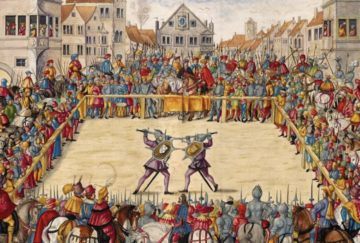 Up until the mid-thirteenth century, you would be fortunate if you were to be tried by a jury of your peers in the king’s court. Throughout the early Middle Ages, this particular court preferred trial by ordeal. The idea was that God favored the innocent, so the defendant would be put through an ordeal in which God would either help him prove his innocence or clarify his guilt. Commonly used methods were trial by cold water, in which the accused would have his hands and feet bound and be thrown into a body of water; if he floated, he was innocent, but if he sank, he was assumed guilty.
Up until the mid-thirteenth century, you would be fortunate if you were to be tried by a jury of your peers in the king’s court. Throughout the early Middle Ages, this particular court preferred trial by ordeal. The idea was that God favored the innocent, so the defendant would be put through an ordeal in which God would either help him prove his innocence or clarify his guilt. Commonly used methods were trial by cold water, in which the accused would have his hands and feet bound and be thrown into a body of water; if he floated, he was innocent, but if he sank, he was assumed guilty.
There was ordeal by hot iron or stone, in which the defendant was made to hold a lump of hot iron or plunge his hand into a pot of boiling water to fetch a stone. If his hand completely healed within three days, then, naturally, God had intervened, demonstrating his innocence. If scars still showed, he could expect a swift execution.
More here.
30 Years Ago Tonight, Sarajevo’s National Library Was Destroyed
Dan Sheehan at Lit Hub:
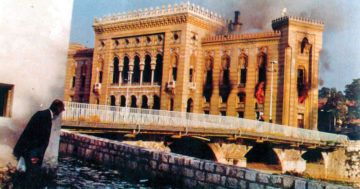 Located on the bank of the Miljacka river in the city’s old Turkish quarter, the beautiful pseudo-Moorish structure, known to locals as Vijećnica (City Hall), was a beloved symbol of the multiethnic, multicultural capital of Bosnia before the entire building, along with two million of the books it housed, went up in flames.
Located on the bank of the Miljacka river in the city’s old Turkish quarter, the beautiful pseudo-Moorish structure, known to locals as Vijećnica (City Hall), was a beloved symbol of the multiethnic, multicultural capital of Bosnia before the entire building, along with two million of the books it housed, went up in flames.
By August 25th, Sarajevo was suffering through the early days of a devastating four year siege (the longest in the history of modern warfare) by Bosnian Serb forces, one which would ultimately claim the lives of over ten thousand of its inhabitants. Every day, from the hills around the city and the windows of captured apartment blocks within it, shells and sniper fire rained down the trapped Sarajevan people—a people who had, only 8 years previous, joyously hosted the 1984 Winter Olympic Games.
more here.
A Sarajevo Diary – From Bad To Worse
We Need to Talk About How Good A.I. Is Getting
Kevin Roose at the NYT:
 “It feels like we’re going from spring to summer,” said Jack Clark, a co-chair of Stanford University’s annual A.I. Index Report. “In spring, you have these vague suggestions of progress, and little green shoots everywhere. Now, everything’s in bloom.”
“It feels like we’re going from spring to summer,” said Jack Clark, a co-chair of Stanford University’s annual A.I. Index Report. “In spring, you have these vague suggestions of progress, and little green shoots everywhere. Now, everything’s in bloom.”
In the past, A.I. progress was mostly obvious only to insiders who kept up with the latest research papers and conference presentations. But recently, Mr. Clark said, even laypeople can sense the difference.
“You used to look at A.I.-generated language and say, ‘Wow, it kind of wrote a sentence,’” Mr. Clark said. “And now you’re looking at stuff that’s A.I.-generated and saying, ‘This is really funny, I’m enjoying reading this,’ or ‘I had no idea this was even generated by A.I.’”
more here.
